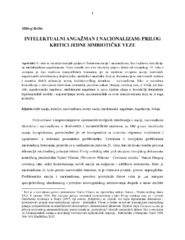Intelektualni angažman i nacionalizam: Prilog kritici jedne simbiotičke veze
Поглавље у монографији (Објављена верзија)
Метаподаци
Приказ свих података о документуАпстракт
U radu se istražuju teorijski pojmovi fenomena nacije i nacionalizma, kao i njihova interakcija
sa intelektualnim angažmanom. Veza između ove dve istorijske pojave datira od evropskog 19. veka i
ocenjena je kao simbioza kompatibilnih fenomena, jer su moderne evropske nacije konstrukti
angažovanih intelektualaca, književnika, umetnika i naučnika, koji su diseminacijom mitotvornih matrica
i narativa sluţili аfirmаciјi novog kolektivističkog idеntitеtа – nacionalizma. Iako se navedena
konstelacija u razvijenim društvima promenila, posebno nakon Drugog svetskog rata, u Srbiji, još kao
delu jugoslovenske zajednice, intelektualni angažman je igrao ključnu ulogu u destrukciji dotadašnjih
legitimacijskih modela i uspostavljanju novih, nacionalističkih sa svim konsekvencama koje su iz toga
proizašle.
In this paper we discuss the relationship and interdependence of intellectual engagement and
nationalism. Starting from the contemporary theoretical approaches towards the phenomenon of nations
and nationalism, we claim that the concepts of nations and modern intellectuals are products of the
European 19th century modernism and that intellectuals, writers, artists and scientists etc., with their
mythologized narratives, played important, if not crucial, role in nation-building processes. Even though
this interdependence of intellectual engagement and nationalism changed in Western Europe after the
Second World War, that was not the case in Serbia, as a part of the Yugoslav state. In Serbia, intellectual
engagement has played a key role in the delegitimisation of the existing socialist model of state and the
creation of new, nationalist ones, with all the consequences.
Кључне речи:
nacija / identitet / nacionalizam / teorije nacije / intelektualci / аngažman / Jugoslavija / SrbijaИзвор:
Angažman: Uvod u studije angažovanosti, 2017Издавач:
- Novi Sad : Akademska knjiga
- Beograd : Institut za filozofiju i društvenu teoriju
Финансирање / пројекти:
- Истраживање климатских промена и њиховог утицаја на животну средину - праћење утицаја, адаптација и ублажавање (RS-MESTD-Integrated and Interdisciplinary Research (IIR or III)-43007)
Колекције
Институција/група
IFDTTY - CHAP AU - Bešlin, Milivoj PY - 2017 UR - http://rifdt.instifdt.bg.ac.rs/123456789/1673 AB - U radu se istražuju teorijski pojmovi fenomena nacije i nacionalizma, kao i njihova interakcija sa intelektualnim angažmanom. Veza između ove dve istorijske pojave datira od evropskog 19. veka i ocenjena je kao simbioza kompatibilnih fenomena, jer su moderne evropske nacije konstrukti angažovanih intelektualaca, književnika, umetnika i naučnika, koji su diseminacijom mitotvornih matrica i narativa sluţili аfirmаciјi novog kolektivističkog idеntitеtа – nacionalizma. Iako se navedena konstelacija u razvijenim društvima promenila, posebno nakon Drugog svetskog rata, u Srbiji, još kao delu jugoslovenske zajednice, intelektualni angažman je igrao ključnu ulogu u destrukciji dotadašnjih legitimacijskih modela i uspostavljanju novih, nacionalističkih sa svim konsekvencama koje su iz toga proizašle. AB - In this paper we discuss the relationship and interdependence of intellectual engagement and nationalism. Starting from the contemporary theoretical approaches towards the phenomenon of nations and nationalism, we claim that the concepts of nations and modern intellectuals are products of the European 19th century modernism and that intellectuals, writers, artists and scientists etc., with their mythologized narratives, played important, if not crucial, role in nation-building processes. Even though this interdependence of intellectual engagement and nationalism changed in Western Europe after the Second World War, that was not the case in Serbia, as a part of the Yugoslav state. In Serbia, intellectual engagement has played a key role in the delegitimisation of the existing socialist model of state and the creation of new, nationalist ones, with all the consequences. PB - Novi Sad : Akademska knjiga PB - Beograd : Institut za filozofiju i društvenu teoriju T2 - Angažman: Uvod u studije angažovanosti T1 - Intelektualni angažman i nacionalizam: Prilog kritici jedne simbiotičke veze UR - https://hdl.handle.net/21.15107/rcub_rifdt_1673 ER -
@inbook{
author = "Bešlin, Milivoj",
year = "2017",
abstract = "U radu se istražuju teorijski pojmovi fenomena nacije i nacionalizma, kao i njihova interakcija
sa intelektualnim angažmanom. Veza između ove dve istorijske pojave datira od evropskog 19. veka i
ocenjena je kao simbioza kompatibilnih fenomena, jer su moderne evropske nacije konstrukti
angažovanih intelektualaca, književnika, umetnika i naučnika, koji su diseminacijom mitotvornih matrica
i narativa sluţili аfirmаciјi novog kolektivističkog idеntitеtа – nacionalizma. Iako se navedena
konstelacija u razvijenim društvima promenila, posebno nakon Drugog svetskog rata, u Srbiji, još kao
delu jugoslovenske zajednice, intelektualni angažman je igrao ključnu ulogu u destrukciji dotadašnjih
legitimacijskih modela i uspostavljanju novih, nacionalističkih sa svim konsekvencama koje su iz toga
proizašle., In this paper we discuss the relationship and interdependence of intellectual engagement and
nationalism. Starting from the contemporary theoretical approaches towards the phenomenon of nations
and nationalism, we claim that the concepts of nations and modern intellectuals are products of the
European 19th century modernism and that intellectuals, writers, artists and scientists etc., with their
mythologized narratives, played important, if not crucial, role in nation-building processes. Even though
this interdependence of intellectual engagement and nationalism changed in Western Europe after the
Second World War, that was not the case in Serbia, as a part of the Yugoslav state. In Serbia, intellectual
engagement has played a key role in the delegitimisation of the existing socialist model of state and the
creation of new, nationalist ones, with all the consequences.",
publisher = "Novi Sad : Akademska knjiga, Beograd : Institut za filozofiju i društvenu teoriju",
journal = "Angažman: Uvod u studije angažovanosti",
booktitle = "Intelektualni angažman i nacionalizam: Prilog kritici jedne simbiotičke veze",
url = "https://hdl.handle.net/21.15107/rcub_rifdt_1673"
}
Bešlin, M.. (2017). Intelektualni angažman i nacionalizam: Prilog kritici jedne simbiotičke veze. in Angažman: Uvod u studije angažovanosti Novi Sad : Akademska knjiga.. https://hdl.handle.net/21.15107/rcub_rifdt_1673
Bešlin M. Intelektualni angažman i nacionalizam: Prilog kritici jedne simbiotičke veze. in Angažman: Uvod u studije angažovanosti. 2017;. https://hdl.handle.net/21.15107/rcub_rifdt_1673 .
Bešlin, Milivoj, "Intelektualni angažman i nacionalizam: Prilog kritici jedne simbiotičke veze" in Angažman: Uvod u studije angažovanosti (2017), https://hdl.handle.net/21.15107/rcub_rifdt_1673 .



